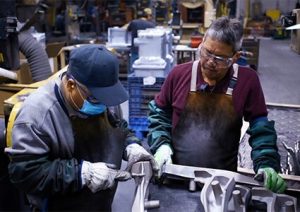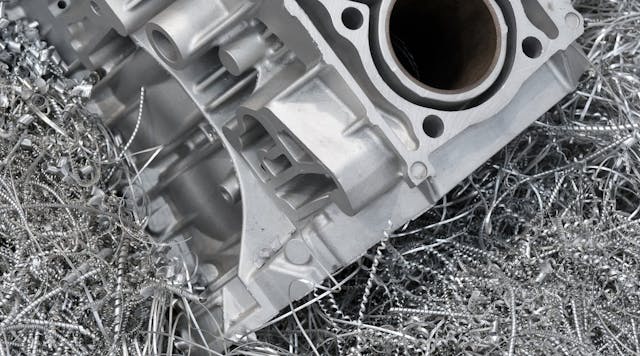Understanding the Advantages and Innovations in the Aluminum Foundry Market
The Aluminum Foundry sector plays an important role in modern production. Its light-weight buildings notably improve gas performance, particularly in aerospace and vehicle fields. In addition, Aluminum's resistance to rust assurances longevity in numerous applications. As the market develops, developments such as sophisticated recycling and additive production are improving manufacturing approaches. Checking out these improvements discloses not just the advantages yet additionally the obstacles in advance for Aluminum factories in a swiftly transforming market.
The Lightweight Benefit of Aluminum
Aluminum's lightweight nature offers significant advantages across different markets, especially in production and transportation. Its low density enables the production of components that are simpler to take care of and set up, causing minimized labor costs and enhanced efficiency. In the automotive market, lighter cars add to boosted gas economic climate and lower emissions, straightening with worldwide sustainability goals. In aerospace, the usage of Aluminum reduces the overall weight of airplane, which is crucial for boosting efficiency and minimizing operational expenses.
Additionally, Aluminum's light-weight residential properties facilitate innovative styles that were formerly impractical with larger products. This adaptability enables suppliers to develop complicated shapes and structures while maintaining structural honesty. Overall, the light-weight advantage of Aluminum not only improves product performance yet additionally drives innovations in technology and layout, making it a favored product in various applications.
Rust Resistance and Sturdiness
The Aluminum Foundry sector is renowned for producing products with exceptional deterioration resistance, making them optimal for numerous applications. This residential property, integrated with boosted architectural integrity, adds to the durable performance benefits that Aluminum elements use. Therefore, industries progressively depend on Aluminum to fulfill demanding ecological problems without compromising quality.
Superior Deterioration Resistance
While numerous steels deal with significant obstacles from environmental aspects, Aluminum stands apart for its premium deterioration resistance, making it a recommended selection in several applications. This home is mostly due to an all-natural oxide layer that bases on the Aluminum surface area, offering an obstacle versus dampness and harsh representatives. Unlike other metals that may corrosion or deteriorate gradually, Aluminum keeps its honesty also in severe environments, such as industrial setups or seaside locations. In addition, its light-weight nature incorporated with rust resistance makes it ideal for applications in aerospace, auto, and marine sectors. Generally, Aluminum's remarkable sturdiness not only enhances item durability yet additionally minimizes maintenance expenses, providing a compelling benefit for makers and customers alike.
Enhanced Architectural Honesty
Designers and designers significantly identify the significance of boosted architectural stability in modern applications, where both deterioration resistance and durability are essential. Aluminum alloys, understood for their lightweight homes, also show phenomenal resistance to rust, making them suitable for rough atmospheres. The cutting-edge methods used in the Aluminum Foundry market add considerably to generating components with boosted sturdiness. Advanced casting procedures and alloy compositions are customized to fulfill particular performance requirements, making sure that frameworks can stand up to extreme conditions without jeopardizing integrity. Moreover, surface treatments and coatings improve the lifespan of Aluminum products, even more alleviating deterioration gradually. This concentrate on boosted architectural honesty not just expands the use of materials but likewise minimizes upkeep expenses, strengthening Aluminum's setting as a material of choice in various industries.
Resilient Efficiency Advantages
Resilient efficiency in Aluminum elements is mainly credited to their exceptional corrosion resistance and toughness. Unlike several steels, Aluminum normally creates a protective oxide layer, which prevents rust and deterioration in various settings, consisting of industrial and aquatic settings. This intrinsic property significantly expands the life-span of Aluminum products, minimizing upkeep and substitute prices. In enhancement, the lightweight nature of Aluminum enhances its applicability across industries without compromising strength. The product's resistance to wear and tear additionally contributes to its reliability popular applications, making it an optimal selection for automobile, aerospace, and building fields. As markets increasingly prioritize sustainability and longevity, Aluminum's efficiency benefits align with modern engineering needs, strengthening its duty in ingenious manufacturing procedures.
Ecological Impact and Sustainability
 As the Aluminum Foundry market develops, it increasingly prioritizes ecological impact and sustainability, acknowledging the demand for accountable methods despite environment modification. Initiatives to decrease waste and energy usage go to the forefront, with numerous factories embracing reusing efforts to redeem Aluminum scrap. This not only reduces raw material usage yet likewise especially reduces down power expense, as recycled Aluminum needs only a portion of the energy contrasted to key production.
As the Aluminum Foundry market develops, it increasingly prioritizes ecological impact and sustainability, acknowledging the demand for accountable methods despite environment modification. Initiatives to decrease waste and energy usage go to the forefront, with numerous factories embracing reusing efforts to redeem Aluminum scrap. This not only reduces raw material usage yet likewise especially reduces down power expense, as recycled Aluminum needs only a portion of the energy contrasted to key production.Furthermore, improvements in exhausts manage modern technologies are being carried out to decrease air pollutants, aligning operations with stricter environmental policies. Foundries are also exploring alternate power resources, such as solar and wind, to power their facilities sustainably. By promoting partnership with stakeholders, the market intends to establish innovative options that enhance environmental stewardship. Jointly, these initiatives highlight a commitment to decreasing the Aluminum Foundry's carbon footprint while promoting a circular economic climate within the manufacturing sector.
Advanced Production Techniques
 Reinventing production processes, the Aluminum Foundry sector is progressively integrating innovative production methods to enhance effectiveness and precision. Strategies such as computer system numerical control (CNC) machining and additive manufacturing have actually emerged as essential parts in optimizing manufacturing operations. CNC machining enables high-precision part construction, greatly reducing product waste and manufacturing time. On the other hand, additive manufacturing opens up brand-new opportunities for complex geometries and light-weight designs that were formerly challenging to accomplish.
Reinventing production processes, the Aluminum Foundry sector is progressively integrating innovative production methods to enhance effectiveness and precision. Strategies such as computer system numerical control (CNC) machining and additive manufacturing have actually emerged as essential parts in optimizing manufacturing operations. CNC machining enables high-precision part construction, greatly reducing product waste and manufacturing time. On the other hand, additive manufacturing opens up brand-new opportunities for complex geometries and light-weight designs that were formerly challenging to accomplish.Additionally, the implementation of automation and robotics in Aluminum shops enhances procedures, reduces human mistake, and improves worker security. These modern technologies assist in a more receptive manufacturing environment, allowing manufacturers to adjust rapidly to market demands. The integration of advanced simulation software application better enhances the layout and testing phases, resulting in superior product top quality. Jointly, these techniques not just enhance functional performance but additionally foster development, positioning the Aluminum Foundry market at the center of modern production.
Developments in Recycling Processes
The Aluminum Foundry sector is not just advancing in producing methods but is also making substantial strides in recycling processes. Developments are emerging to enhance the performance of reusing techniques, decreasing energy usage and boosting sustainability. Advanced sorting technologies, such as automated optical sorting, make it possible for the recognition and splitting up of Aluminum from various other materials with high precision. This leads to a greater quality of recycled Aluminum, which is crucial for maintaining the stability of the final items.
Furthermore, closed-loop recycling systems are being applied, permitting makers to reuse Aluminum scrap within their very own production procedures. This decreases waste and advertises a round economy. In addition, check these guys out research study right into new recycling strategies, such as hydrometallurgical processes, supplies the capacity for recuperating Aluminum from intricate waste streams. These technologies not only add to minimizing the carbon footprint of the Aluminum Foundry sector but likewise reinforce its financial practicality in an increasingly ecologically aware market.
Applications Across Different Industries
Numerous industries are increasingly acknowledging the convenience and benefits of Aluminum Foundry items, bring about extensive applications across sectors such as automobile, consumer, building, and aerospace products. In the automotive market, Aluminum castings add to lightweight automobile designs, improving gas performance and efficiency. Aerospace manufacturers utilize Aluminum parts for their strength-to-weight ratio, necessary for airplane frameworks and parts.
In building, Aluminum is preferred for its durability and resistance to rust, making it excellent for home window frames, roofing, and structural assistances. Consumer items additionally take advantage of Aluminum Foundry products, as seen in kitchenware, electronics, and packaging, where light-weight and recyclable products are important.
The versatility of Aluminum Foundry methods enables accurate requirements and intricate styles, satisfying helpful site the diverse demands of these industries. Therefore, Aluminum Foundry items are ending up being integral to modern-day production procedures throughout numerous industries.
Future Fads in Aluminum Foundries
As industries continue to progress, Aluminum foundries are positioned to accept numerous crucial patterns that assure to boost effectiveness and sustainability. One noticeable pattern is the boosting adoption of digital innovations, consisting of automation and expert system, which improve procedures and improve quality control. On top of that, the push in the direction of lasting techniques is leading foundries to spend in recycling innovations, greatly reducing waste and power usage.
 Another arising fad is making use of sophisticated alloys and materials, catering to the growing need for light-weight and resilient elements throughout numerous fields (Aluminum Foundry). The assimilation of additive production methods is anticipated to reinvent component style, providing modification and decreasing lead times.
Another arising fad is making use of sophisticated alloys and materials, catering to the growing need for light-weight and resilient elements throughout numerous fields (Aluminum Foundry). The assimilation of additive production methods is anticipated to reinvent component style, providing modification and decreasing lead times.Cooperation with study establishments is additionally expected to drive development, as shops look for to create new procedures and products. Aluminum Foundry. Collectively, these trends suggest a transformative future for the Aluminum Foundry sector, straightening with broader goals of sustainability and efficiency
Often Asked Inquiries
What Are the Common Expenses Linked With Aluminum Foundry Manufacturing?
The normal prices connected with Aluminum Foundry manufacturing consist of resources, labor, power, tools upkeep, and overhead expenditures. These factors collectively affect the total financial investment needed for efficient Aluminum casting operations.
Just How Does Aluminum Contrast to Other Metals in Strength?
Aluminum, while lighter than numerous steels, displays remarkable strength-to-weight proportions. Compared to steel, Aluminum is less strong yet uses exceptional rust resistance, making it a favorable choice in applications where weight and toughness are crucial.
What Precaution Remain In Place in Aluminum Foundries?
Safety procedures in Aluminum shops usually include required personal safety equipment, air flow systems to control fumes, normal devices upkeep, training programs for staff members, and adherence to stringent safety and security index policies to reduce risks connected with liquified steel handling.
How Is Quality Assurance Managed in Aluminum Casting Processes?
Quality assurance in Aluminum casting procedures entails rigorous inspections at different phases, including basic material analysis, procedure surveillance, and end product testing. Methods such as statistical procedure control and non-destructive testing assurance adherence to industry requirements.
What Qualifications Are Essential for Aluminum Foundry Suppliers?
The significance of accreditations for Aluminum Foundry distributors includes ISO 9001 for quality monitoring, ISO 14001 for environmental administration, and industry-specific standards like ASTM and SAE, making sure conformity, safety, and integrity in making procedures.
The Aluminum Foundry sector plays a crucial duty in contemporary manufacturing. The Aluminum Foundry industry is renowned for generating products with premium rust resistance, making them excellent for various applications. Reinventing production procedures, the Aluminum Foundry market is significantly incorporating sophisticated manufacturing strategies to improve efficiency and accuracy. The Aluminum Foundry sector is not only advancing in making methods but is additionally making substantial strides in recycling processes. As industries proceed to progress, Aluminum shops are poised to embrace a number of essential fads that promise to enhance effectiveness and sustainability.